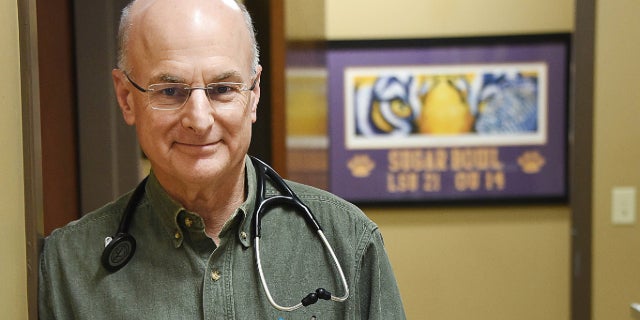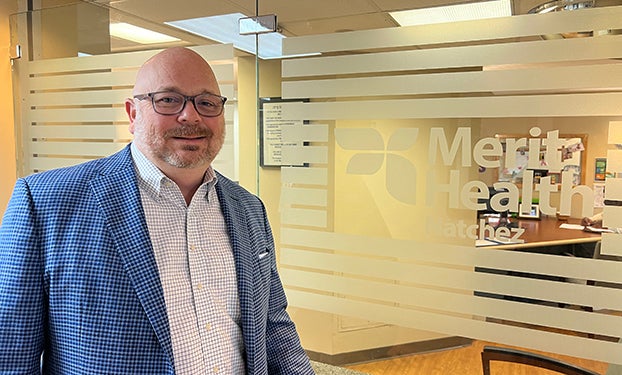Stubbs: Follow the money to find the power in healthcare
Published 12:28 pm Saturday, March 23, 2024

- Dr. Kenneth Stubbs, who practiced medicine in Natchez for 40 years before retiring in February, raises concerns about the corporatization of health care in America. (Ben Hillyer | The Natchez Democrat)
|
Getting your Trinity Audio player ready...
|
Editor’s note: This story is part of The Natchez Democrat’s Profile 2024, published in its print edition on Sunday, March 24.
By the Numbers: 50 percent of Americans are now covered by either Medicaid or Medicare.
NATCHEZ — On Wednesday, Sept. 3, 2014, Dr. Kenneth Stubbs called a meeting of his patients to discuss a radical change he was making with his practice. More than 150 showed up that night at the meeting room at Merit Health Natchez.
He would hold another, similar meeting with his patients the next Saturday morning to make certain they all had a chance to hear about the coming change.
Beginning Jan. 1, 2015, Stubbs stopped accepting insurance of any kind — including Medicaid and Medicare — for payment for his services.
Almost a decade later, on the eve of his retirement at age 70, Stubbs looked back on that change and provided his thoughts on the trajectory of healthcare in America.
Follow the money
“The biggest change since I began practicing medicine in 1982 is the continued intrusion of the people who control the money,” Stubbs said. “Like many things in life, you follow the money and you find out where the power is.
“That’s sad, but when I started in health care — and I’m not saying it was all ideal — the hospitals were paid basically on a cost-plus basis through Medicare. And gradually, as more Americans have come to depend on the government for payment of healthcare through Medicaid and Medicare, which covers over 50 percent of Americans, they control a bigger piece of what happens.”
The government set the trends, Stubbs said, and private insurers often followed.
“In 1983, the government introduced a concept known as Diagnostic Related Group, DRGs, and so when you came into the hospital, they would pay you X amount of dollars for your admitting diagnosis. And if you stayed in the hospital for two days or five days or 20 days, it didn’t matter. That’s all you got,” he said.
Hospitals had to develop systems to provide more efficiency.
“The hospital said if we let someone with a simple pneumonia stay here for 10 days because they are still feeling tired, we are going to lose our shirts. So hospitals had to develop guidelines to say this is how we are going to do it, so when they meet those levels of no fever and such, you’ve got to send them home.
“Now, that had some good parts to it, but eventually they developed the hospitalist system,” Stubbs said.
The hospitalist system is when a hospital hires a physician or a team of physicians to care for patients in the hospital, rather than the private physician coming to the hospital to care for the patient.
“The hospitalist is a physician who works for the hospital in the hospital because the hospital can control them. If the hospitalist doesn’t follow the guidelines of the hospital, the hospital can not renew their contract,” he said. “I don’t like the hospitalist system. I like to take care of my own people in the hospital.
“So, the hospital because of pressures from the payers had to develop tighter rules, and the payer, namely the federal government and now big insurance companies control more and more of what happens. They control the purse, and that’s led to many more restrictions on the freedoms physicians used to have to care for their patients,” Stubbs said. “Again, there are good sides and bad sides to that. We have bad doctors. We have some of us who order more tests than we should. It’s very complex. It is very complicated. We physicians perhaps needed some limits, but at the same time, it’s gone overboard.”
Prior authorization
Insurance companies in recent years have become more and more overbearing and interfere with what was the normal practice of medicine, Stubbs said.
“I can’t order some simple test without getting prior approval from an intermediary hired by the insurance company to hear your plea. Why do you want to do this MRI? Why do you need a stress test? Why does your patient need this medication? It’s become more and more of an everyday thing you have to do.
“A few years ago, if I wanted a stress test for a patient, I sent them for a stress test. Now, you have to seek prior approval. I used to order a CAT scan if you had a bad headache or chest pain or something and I needed to get a CAT scan of your chest, you would go get it. No, no, not now. Now you have to call the representative of the insurance company and say this is why I am doing it. And usually, it will come with a statement that will say here is your approval number. You head to the hospital and they do the CAT scan, but wait, it says at the bottom, this approval is no guarantee of payment.
“And so, the hospital will do the test, and a month later they find out the insurance company is refusing to pay for it. So you have to appeal. You have to do it in writing or you have to call and do an appeal. Now, I find in most cases when you do the appeal, it is approved because most doctors are acting truly in the interest of patients and they aren’t trying to do stuff totally stupid, but that’s time-consuming and that intrusion is aggravating,” Stubbs said.
There have been proposals from healthcare providers to help ease this burden, but not have been successful.
“Some proposals have sought to try to relieve some of that pressure, like if you’ve done so many of these tests and 90 percent of them have made it through the appeals process, just leave the doctor alone. He’s doing a good job. He knows what he’s doing. But the insurance companies won’t do that,” Stubbs said.
The corporatization of medicine
“Every step of the way becomes a bigger headache. And that’s why you see physicians joining corporations, rather than private practices. When I began practicing, 75 percent of doctors were in private practice, their own practices. Now it’s less than 25 percent because the rest are controlled by corporations because you need a corporation around you now that has the lawyers, the secretaries and clerks, the administrators to fight these people and to do the coding that allows the proper appeal. And so doctors say, I don’t have time for that, I want to be a doctor, so I’ll work for you, hospital company, you have the lawyers and you have the administrators to handle these things.
“Hospital administrator positions have increased 750 percent in growth since 1980. Medical providers have gone up 200 percent. So there are three or four times more administrators than there ever were, compared to the number of providers of health care and that’s to take care of these burdens of oversight,” he said.
An insurance-free practice
Going insurance-free in his practice — some call it concierge medicine — worked out well for Stubbs, he said.
Of course, his patients cannot give up their private health insurance coverage. They still need it for hospital stays, tests, lab work, and the like.
However, since January 2015, Stubbs has not accepted insurance for the services he has provided his patients. They have paid a set fee at the beginning of the year, depending on their level of need for him.
“It’s worked out great. The thing that it did is patients knew what it was going to cost to see me. This is it. And if you like the kind of care I give, you are going to pay that,” he said. “And I didn’t have to fight to get paid for me. All of my fights were to get stuff done for patients. These prior approvals. The MRI that I think you need. If I have a patient of mine in the hospital and I think they need to stay another day, I can keep them there because the hospital can’t fire me. They can call me up and bug me, and a lot of times they are right, I could have let them go home a day earlier, but he didn’t have anyone at home to take care of him and I wanted him to stay.
“It’s made it to where I can earn a living without fighting every day. Most offices, ballpark figure, 40 percent of income that comes into a doctor’s office is used for the purpose of bill collecting,” Stubbs said. “And so you hire the personnel up front to check the coding and make certain the proper codes are sent to the insurance company. You have a billing lady to make sure everything is properly filed with the insurance company. Then, you have a billing company that actually sends the bill. So there are layers you have to have in place to make sure that you are getting paid for your filed charges.
“Now, it’s just me, my wife, and my nurse, and I use a couple of the employees at the practice and I pay part of their salaries to answer phones and send faxes and things like that,” he said.
He said administrators and others have told him over the years to turn over more and more tasks to lower-level employees, but Stubbs has said no.
“I like to call my patients and talk to them. I just have a little more personal approach to health care. But that’s an individual thing. It’s just how I like to practice medicine. Everybody is different,” he said.
He is concerned the new physicians are being trained in how to do things in a corporate, rather than an independent thinking way.
“I do think young people in healthcare today are being trained more in this corporate mindset — because you are going to work for somebody, rather than for yourself, you to do things their way.
“There is so much great stuff coming out of health care today. It’s just mind-boggling. Less than 10 percent of the medicines we use today were being used back when I finished school. The development of drugs, the new techniques, and what they can do to open up arteries and treat cancer is mind-boggling.
“They have drugs now that alter gene structure for sickle cell and other stuff. It’s really phenomenal. They are training physicians to take advantage of these new techniques, but my feeling is they are moving further and further away from the personal touch in medicine. And when you are really sick, when you really, really feel bad, you want to have a relationship with a healthcare provider who takes an interest in you and will see you through. There are plenty of doctors like that. But I think we have moved more away toward the corporatization of healthcare and physicians are more or less a commodity, and are being traded like a commodity.”






